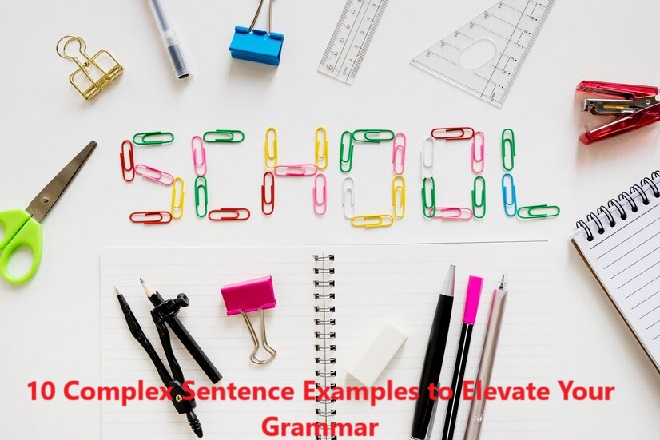
Grammar is the foundation of effective communication. Whether you’re writing an essay, a blog post, or a professional email, mastering complex sentences can take your writing to the next level. Complex sentences add depth and clarity to your ideas, helping you express more intricate thoughts. In this article, we will explore 10 complex sentence examples that will help elevate your grammar skills.
What is a Complex Sentence?
A complex sentence is one that contains an independent clause (a complete thought) and at least one dependent clause (which cannot stand alone). The dependent clause often provides additional information, context, or explanation to the independent clause. Mastering the structure of complex sentences allows you to combine related ideas and improve the flow of your writing.
For example:
- Although the weather was bad, we decided to go on the trip Complex Sentence Examples.
In the sentence above, “Although the weather was bad” is the dependent clause, while “we decided to go on the trip” is the independent clause Complex Sentence Examples.
Why are Complex Sentences Important?
Using complex sentences can make your writing sound more professional and well thought out. They help you:
- Express ideas clearly and concisely.
- Show relationships between ideas.
- Improve the flow of your writing.
- Avoid repetitive sentence structures.
Now that we’ve covered the basics, let’s dive into 10 complex sentence examples to see how they work in practice Complex Sentence Examples.
Example 1: Expressing Cause and Effect
- Example: Because she had studied for weeks, she passed the exam with flying colours.
In this sentence, “Because she had studied for weeks” is the dependent clause explaining the cause, while “she passed the exam with flying colours” is the independent clause, highlighting the effect. This structure allows you to emphasize the reason behind an action.
Example 2: Adding Conditions
- Example: If you follow the instructions carefully, you will complete the project on time.
Here, “If you follow the instructions carefully” serves as the condition (dependent clause), and “you will complete the project on time” is the result (independent clause). Using conditional sentences like this helps provide clarity on how specific actions lead to specific outcomes.
Example 3: Showing Contrast
- Example: Although the movie was long, it kept the audience engaged.
In this sentence, “Although the movie was long” is the dependent clause, providing a contrast to the independent clause, “it kept the audience engaged.” Complex sentences like this help highlight differences or unexpected results in your writing.
Example 4: Providing Explanations
- Example: Since the store was closed, we decided to go to a different one.
“Since the store was closed” (dependent clause) provides an explanation for why “we decided to go to a different one” (independent clause). This sentence structure is useful for explaining the reasons and motivations behind decisions or actions.
Example 5: Demonstrating Time Relationships
- Example: After the rain stopped, we went for a walk in the park.
The dependent clause, “After the rain stopped,” shows when the action in the independent clause, “We went for a walk in the park,” took place. Complex sentences with time relationships add clarity and precision to your narrative.
Example 6: Introducing Additional Information
- Example: Even though he had a busy schedule, he made time for the meeting.
In this case, “Even though he had a busy schedule” (dependent clause) provides additional information that makes the independent clause, “he made time for the meeting,” more meaningful. This kind of sentence helps you elaborate on key points without sounding repetitive.
Example 7: Making Comparisons
- Example: While her presentation was impressive, her colleague’s was even more thorough.
Here, the dependent clause, “While her presentation was impressive,” sets up a comparison to the independent clause, “her colleagues was even more thorough.” Complex sentences are great for making comparisons because they clearly define what you’re comparing and why.
Example 8: Expressing Purpose
- Example: He studied harder so that he could get into his dream college.
In this sentence, “so that he could get into his dream college” (dependent clause) explains the purpose of the independent clause, “He studied harder.” Purpose-driven complex sentences are common when you’re explaining why an action is taken.
Example 9: Indicating Place
- Example: Wherever she goes, she always makes friends.
“Wherever she goes” (dependent clause) tells us the place related to the independent clause, “she always makes friends.” This type of complex sentence is helpful when you’re discussing actions tied to specific locations.
Example 10: Highlighting Conditions of Uncertainty
- Example: If it rains tomorrow, the event will be postponed.
The dependent clause, “If it rains tomorrow,” introduces a condition of uncertainty that affects the independent clause, “the event will be postponed.” These sentences are crucial when you’re discussing hypothetical or uncertain situations.
How to Build Your Own Complex Sentences
Now that you’ve seen 10 complex sentence examples, it’s time to start building your own. Here are a few tips to help you incorporate complex sentences into your writing effectively Complex Sentence Examples:
1. Use Subordinating Conjunctions
Subordinating conjunctions (like “because,” “although,” “if,” and “since”) help link dependent clauses to independent ones. These words are key to creating complex sentences. For example:
- Incorrect: She went to the store. She needed milk.
- Correct: She went to the store because she needed milk.
2. Combine Related Ideas
When two ideas are related, try to combine them into one complex sentence. This not only makes your writing more efficient but also helps show the relationship between the two thoughts.
3. Avoid Overuse
While complex sentences can add depth to your writing Complex Sentence Examples, too many can make your text difficult to read. Balance them with simpler sentences for better flow and readability Complex Sentence Examples.
Conclusion
Mastering complex sentences is a key step in improving your grammar and writing. They allow you to express more intricate ideas, link related thoughts, and create a more engaging narrative flow. By practising with the examples provided in this article, you can start incorporating complex sentences into your writing, making it clearer, more concise, and more professional Complex Sentence Examples.
FAQs
1. What is the difference between a complex and a compound sentence?
A complex sentence contains one independent clause and at least one dependent clause, while a compound sentence contains two or more independent clauses joined by a conjunction Complex Sentence Examples.
2. Why should I use complex sentences in my writing?
Complex sentences help convey more detailed information and express the relationship between ideas, making your writing more sophisticated and easier to follow Complex Sentence Examples.
3. How can I improve my complex sentence skills?
Practice is key. Write more and experiment with combining related ideas. Use subordinating conjunctions and try to vary your sentence structure to avoid repetition Complex Sentence Examples.
Read More:

